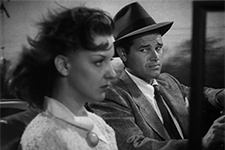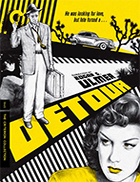Detour
|  Edgar G. Ulmer’s Detour is one of the darkest and most fatalistic of the postwar film noir—to the point that, if it didn’t work so well, it could be mistaken for a postmodern parody of the genre. Steeped in claustrophobic rooms lit with German expressionist chiaroscuro lighting that are contrasted with bright scenes in the open desert, the film hinges on any number of utterly implausible contrivances that somehow weave together into a tapestry of fatalistic disaster that is more tragedy than farce. The screenplay by Martin Goldsmith, who adapted his own 1939 novel, is a masterclass in narrative economy and juicy dialogue that is chewed up, spit out, then chewed on some more by the cast, while Ulmer, as proficient a director as ever worked the B-movie factories in 1940s Hollywood, makes the most of a tiny budget, evoking the streets of New York with fog machines and a few lampposts and turning a single apartment into an expressive hothouse of conflict and turmoil. The film centers on Al Roberts (Tom Neal), a New York pianist whose girlfriend, a singer named Sue (Claudia Drake), leaves him behind for possible stardom in Los Angeles. Desperate to be reunited with her, he leaves his job and tries to hitchhike across the country, a grueling experience that eventually lands him in the car of a genial blowhard named Charles Haskell (Edmund MacDonald), who mysteriously dies while they are driving down a highway somewhere in Arizona in the dead of night. Panicked that he will be blamed for murder, Al makes the first of a series of disastrous decisions, burying the body and taking on Haskell’s identity to get him to California. The second of his disastrous decisions takes place the next morning, when he decides to give a ride to a young woman named Vera (Ann Savage), who immediately uncovers his ruse because she happened to have been given a ride by the real Haskell the day before. Vera turns out to be the most vicious of femme fatales, a ruthless, sneering, sharp-tongued opportunist who doesn’t bother to seduce and ensnare Al, as Barbara Stanwyck’s Phyllis Dietrichson did to Fred MacMurray’s Walter Neff in Billy Wilder’s Double Indemnity (1944) the year before, but straight-out bullies and threatens him into doing her bidding. She forces him to give her all the money he stole from Haskell and convinces him to sell the dead man’s car. But, when she learns from a newspaper headline that Haskell was the son of a dying millionaire, she becomes obsessed with a plan that involves Al continuing to pretend to be Haskell to collect the inheritance. Al rightly sees that it is a delusional plan with too many holes to count, but Vera is insistent, keeping Al trapped in a Hollywood apartment with threats of calling the police while waiting for the patriarch to die. As James Naremore notes in his book More Than Night: Film Noir in Its Contexts, had Edgar G. Ulmer not existed, he probably would have needed to be invented. A product of Weimer-era German cinema, he worked on the production design and sets for Carl Boese and Paul Wegener’s The Golem (1920), F.W. Murnau’s The Last Laugh (1924), Ernst Lubitsch’s Lady Windermere’s Fan (1925), and Fritz Lang’s Metropolis (1927), Spies (1928), and M (1931), among others. His first major Hollywood directorial assignment was the Bela Lugosi-Boris Karloff shocker The Black Cat (1934), which he so infused with German expressionist motifs and grandiose visual flourishes that he lost his gig with Universal (it didn’t help that he also had an affair with Shirley Castle, the wife of Universal president Carl Laemmle’s nephew). He spent the rest of his career directing low-budget movies for various Poverty Row studios, where he was later recognized by French critics and adherents of the auteur theory popularized by American critic Andrew Sarris, who dubbed him “one of the minor glories of the cinema” whose personal style transcended the “lowest depths of Poverty Row.” That indelible style is clearly on display all throughout Detour, which is rich in visual innovation and clever stylistic choices that belie its tiny budget. From the use of oversized props to create a sense of the slightly surreal (in this case, a coffee mug), to the purposefully theatrical use of lighting (when it comes time to enter the subjective, the lights dramatically dim and a spotlight comes up on our protagonist’s haunted eyes), Ulmer digs into a deep bag of tricks, but somehow manages to avoid feeling overly mannered or pretentious. It helps that his actors are so thoroughly committed to their role, with Tom Neal giving us a deft portrait of a man smothered by the hand of fate and Ann Savage tearing into her femme fatale trappings like a ravenous animal. Her Vera is very nearly feral in her relentless opportunism and disregard for anyone other than herself, and at times she feels like she escaped from of a John Waters movie (one can imagine Divine watching her performance over and over in preparation for Multiple Maniacs and Female Trouble). At other times, though, she allows us to see Vera as quite pathetic, especially when she is trying and failing to seduce Al, whose victimization renders any sexual attraction moot. She is psychotic, yet also a bit sad, a complex layering of emotions that confounds at every turn. While Detour relies heavily on the nature of fate and arguably exploits it for narrative convenience—“Fate or some mysterious force can put the finger on you or on me for no good reason at all,” Al laments near the end of the film—it stays with us primarily because its portrait of human desperation is so direct, so sharp-edged, so genuine.
Copyright © 2019 James Kendrick Thoughts? E-mail James Kendrick All images copyright © The Criterion Collection | |||||||||||||||||||||||||||||||
Overall Rating: 


 (3.5)
(3.5)


